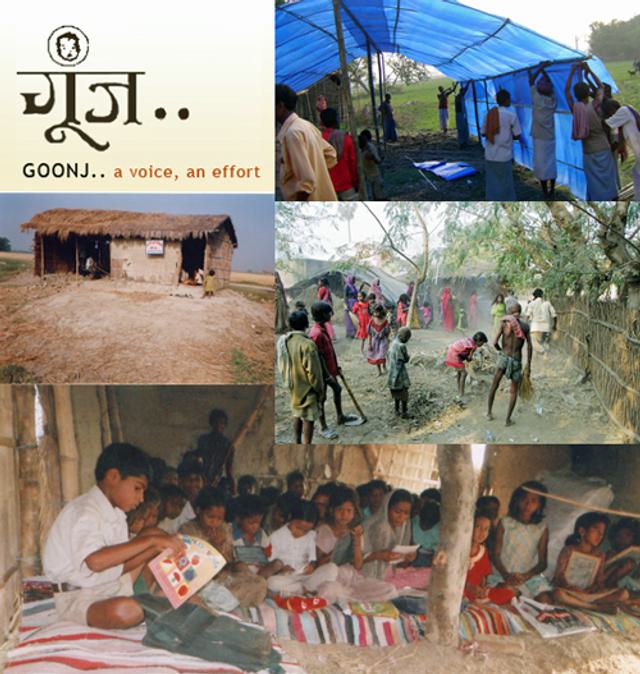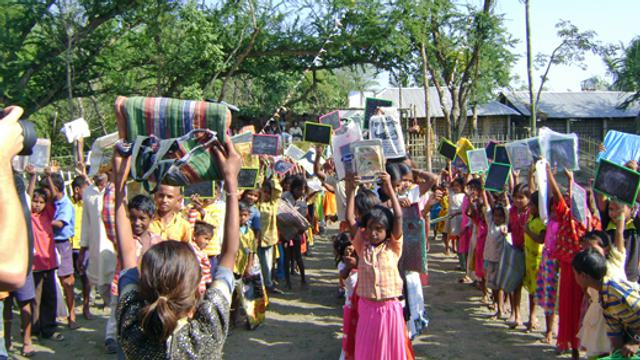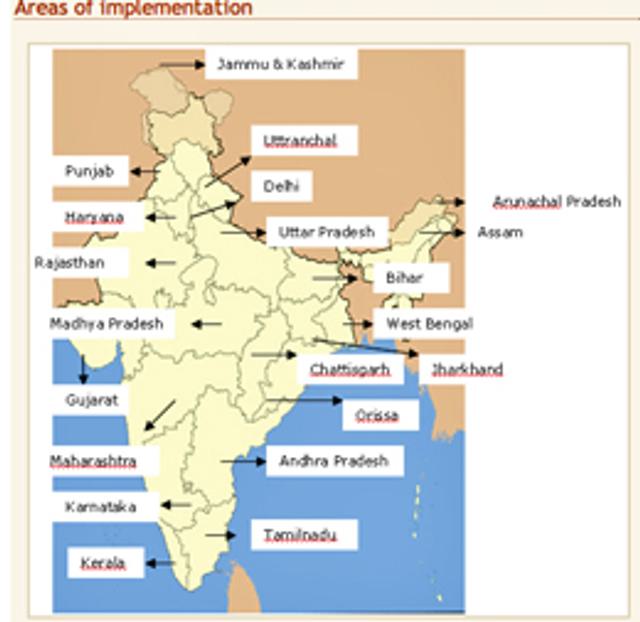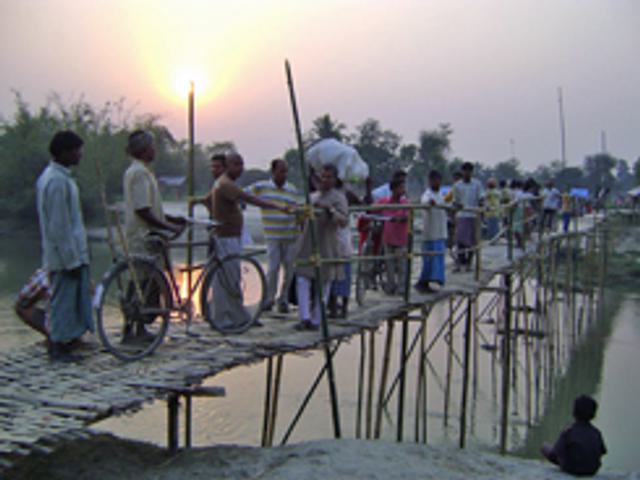Goonj..: dignity through recycled clothing
- Exhibited by
- Sattva
- Added
- October 28, 2009
- Medium of Communication
- Target Audience
- Type of Charity
- Community & social services, poverty/social justice, public/society benefit.
- Country of Origin
- India.
- Date of first appearance
- 1998.
SOFII’s view
Collecting clothing for distribution or resale is one of the most ancient and venerable of charitable activities. The charity gift, or thrift, shop concept is built upon it. So SOFII is delighted to honour this enterprising initiative from Goonj.., the first organisation in India to address the issue of decent clothing. There is obviously massive practical application in the concept of 'turning one person's waste into a resource for others'. What we like most about this is the degree of enterprise shown by the organisers and their absolute commitment to what they are doing. Goonji.. is the Hindi word for echo; the two dots signify the reverberation of the echo.
Creator / originator
Anshu Gupta and the Goonj.. team
Summary / objectives
Clothes have always been identified as a basic need in India. 'roti, kapda, makaan', translated as 'food, cloth and shelter' are referred to as the fundamental needs in election campaigns and manifestos. However, there are very few focused efforts to make decent clothing available to people in rural areas. Every year a large number of deaths are reported due to lack of clean and comfortable clothing.
On the other end of the spectrum – getting rid of waste is in itself a prevalent problem in today's consumer society. There are families that regularly buried old clothes as they did not know what to do with them.
Goonj.. aims to turn one person's waste into a resource for another by collecting basic amenities from urban areas to pass on to the under-privileged in rural communities. The key focus of Goonj.. is the clothing campaign, referred to as a 'Vastra Samman' (Dignifying Clothing) campaign. Rather than collecting money to help people, Goonj.. believes in collecting clothes directly because discarded clothes, found abundantly in urban areas, are very valuable to those in the villages.
Background
Anyone who wants to contribute can run collection campaigns on behalf of Goonj.. .Each day, Goonj.. receives 15-20 calls, in Delhi alone, from individuals and organisations who would like to run clothes collection campaigns. The volunteers are sent an electronic poster and other required collaterals by post. Volunteers can then run the campaign from their homes and drop off the clothes at a local collection office.
Collecting clothes from all over the country and making them available to those in need can be a major infrastructural challenge. By forging partnerships with local organisations, Goonj.. is able to achieve greater penetration and impact because the partner organisations cover the costs of transferring the clothes to the sorting centre, and overall costs to run the operations are lowered significantly. In order to ensure that the collected clothes reach the distant locations, Goonj.. partners with government bodies, such as the Indian Army, to transfer the clothes. Thanks to such efforts, it takes only 97 paise per item, right from collection to sorting, packing, transportation, and distribution to any remote part of the country
Anshu Gupta, the founder of Goonj.., is an Ashoka fellow and uses his network with other Ashoka fellows and social activists across the country to collect clothes locally. These organisations work as local collection offices and cover the costs for collecting the clothes and transferring them to Goonj... In addition, Goonj.. has partnered with over 150 grassroots organisations, including panchayats (local governance bodies), NGOs and social activists. Organisations, such as Residence Welfare Associations, carry out door-to-door campaigns. The Goonj.. website provides step-by-step instructions and guidelines on how to conduct such campaigns.
Special characteristics
Goonj.. has successfully implemented a fundraising model focused on collecting clothes. At the same time, they can use their current network to collect other basic amenities. Goonji..'s website already lists footwear, untensils, stationery, paper, food (pulses, rice, sugar), school materials and newspapers as possible materials that can be contributed.
The clothes collected as part of the Vaastra Samman programme are processed to address specific needs in the rural areas. An excellent example of this is the 'not just a piece of cloth' campaign, which provides sanitary napkins to women in rural communities. Menstrual hygiene is one of the most neglected and the least discussed topics in rural areas. Millions of women use sand, wood ash, old rags, newspapers and even plastic bags due to non-availability of sanitary pads in India. By reusing cotton clothes, Goonj.. is able to provide these women with a clean cloth pad for 60 paise (less than 10 cents).
Influence / impact
As part of the clothes for work programme, the villagers are encouraged to take up tasks to benefit their villages and are paid in return through clothes. For instance, a well was built in the Khandwa region, in the north west of India, for zero cost. Recently, a bridge that was 200ft long was built in one of the rural areas in Bihar for just 2,250 rupees (46 dollars) through the efforts of the villagers. By making them work for the clothes, Goonj.. is able to create sustainable impact in the communities.
Through its efforts, Goonj.. is also creating awareness so that other organisations can participate in solving the issue.
By working closely with organisations spread across the country, Goonj.. runs a nationwide network to collect and distribute clothes, minimising the cost per item to less than 1 rupee (2 cents).
Results
Goonj.. was founded in 1998 in Delhi, India with only 67 items of clothing Now it has a five member governing body with over 300 volunteers all over the country. It reaches out to 21 states and dispatches over 40 tonnes of clothes per month (from Delhi alone). This does not include clothes collected in other parts of the country or clothes collected for disaster relief.
In 2008, GOONJ.. was awarded the Indian NGO of the year award for its governance and practices. Their effort to provide sanitary napkins to women in rural areas has also won the Changemakers Innovation award. The Vastra Samman programme was recognised as a Good Practice in the Dubai International Awards in July 2007
Merits
Fundraising does not limit itself to money but extends to finding innovative ways of addressing the needs of those in need. By building a network of partner organisations and by ensuring that anyone who is interested can help by reaching out to the whole population, Goonj.. efforts cross the geographical boundaries and create sustainable impact.
More information about Goonj.. is available at: http://www.goonj.info.




Also in Categories
-
- Small charities
-

















